Where To Find Legal Representation For Your Snapchat Lawsuit
- Last Updated: September 15th, 2025

Attorney Jessie Paluch, founder of TruLaw, has over 25 years of experience as a personal injury and mass tort attorney, and previously worked as an international tax attorney at Deloitte. Jessie collaborates with attorneys nationwide — enabling her to share reliable, up-to-date legal information with our readers.
Legally Reviewed
This article has been written and reviewed for legal accuracy and clarity by the team of writers and legal experts at TruLawsuit Info and is as accurate as possible. This content should not be taken as legal advice from an attorney. If you would like to learn more about our owner and experienced injury lawyer, Jessie Paluch, you can do so here.
Fact-Checked
TruLawsuit Info does everything possible to make sure the information in this article is up to date and accurate. If you need specific legal advice about your case, contact our team by using the chat on the bottom of this page. This article should not be taken as advice from an attorney.
Key Takeaways:
- For a Snapchat lawsuit, seek attorneys with expertise in social media law and successful track records against platforms like Snap Inc.
- Early consultation with potential lawyers is key, especially after incidents or when rights related to Snapchat use appear violated.
- Valuable evidence includes chat logs, screenshots, and medical reports if harm occurred due to the platform's alleged negligence.
Overview of the Snapchat Lawsuit
On this page, we’ll discuss how to find representation to file a Snapchat Lawsuit, documents to gather as evidence in the Snapchat Lawsuit, when to consult an experienced social media attorney, and much more.
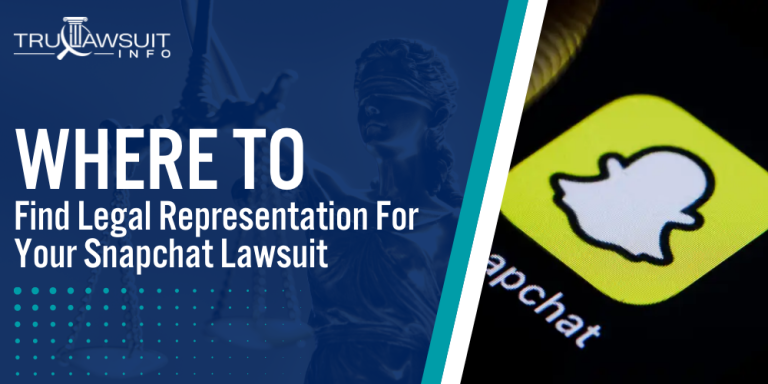
Intro to the Snapchat Lawsuit
Snapchat has been linked to various lawsuits across the United States, with allegations of causing harm, especially to minors.
It underscores the necessity of retaining attorneys who understand the intricacies of laws like the Communications Decency Act and possess a strategic approach toward challenging social media giants.
If you or a loved one have experienced mental health issues after developing a social media addiction, you may be eligible to file a Snapchat lawsuit.
Contact TruLawsuit Info for a free consultation, or use the chatbot on this page for a free case evaluation.
Table of Contents
Understanding the Legal Grounds for a Snapchat Lawsuit
Snapchat lawsuits can stem from various legal grounds, some centering on the platform’s content moderation obligations under the Communications Decency Act and their relation to activities that could harm users’ mental health or contribute to illegal activities.
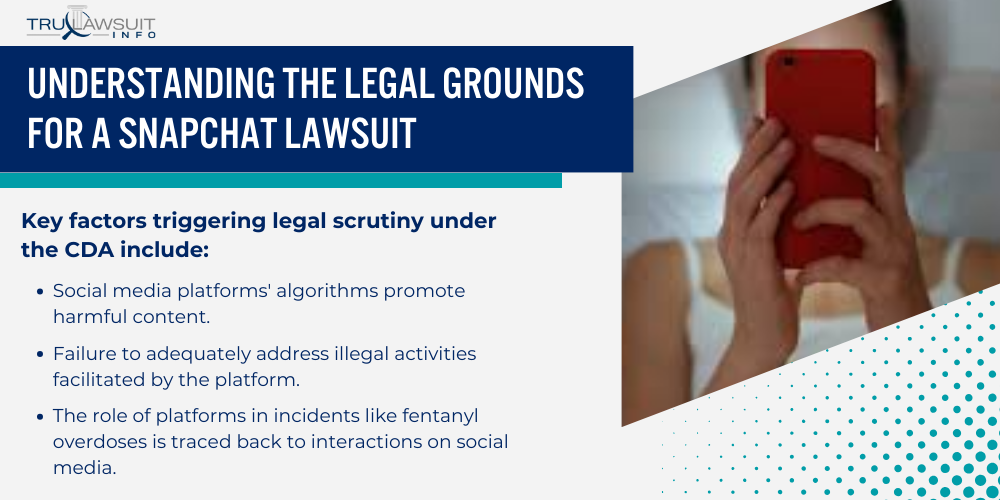
Communications Decency Act and Social Media Platforms Accountability
The Communications Decency Act (CDA), specifically Section 230, has been pivotal in defining the legal framework for social media platforms.
This act shields social media companies from liability for the content their users post.
However, lawsuits may arise when the platform’s involvement goes beyond mere hosting of content.
Key factors triggering legal scrutiny under the CDA include:
- Social media platforms’ algorithms promote harmful content.
- Failure to adequately address illegal activities facilitated by the platform.
- The role of platforms in incidents like fentanyl overdoses is traced back to interactions on social media.
- Complexities involving new features and whether they qualify for immunity under the CDA.
Role of Social Media Platforms in Mental Health and Illegal Activities
Concern for the youth mental health crisis has escalated scrutiny on social media platforms like Snapchat.
The company’s responsibility is questioned, especially when:
- Features and algorithms potentially lead to addiction or worsen mental health.
- Content on the platform is linked directly to real-world harm, including fentanyl overdoses.
- The lawsuit alleges that the company has not taken sufficient steps to protect its users.
- The platform’s role in the spread of illegal material, despite not creating the content themselves.
In conclusion, navigating the grounds for a social media platform Snapchat lawsuit requires a nuanced understanding of the intersection between technology and law, focusing on the responsibilities of social media platforms and the protections afforded by the Communications Decency Act.
Identifying the Social Media Companies Involved
When seeking legal representation for a lawsuit involving Snapchat, it’s crucial to accurately identify all the involved parties, from the plaintiffs and their claims to the defendants, including Snap Inc. and any implicated third-party entities.
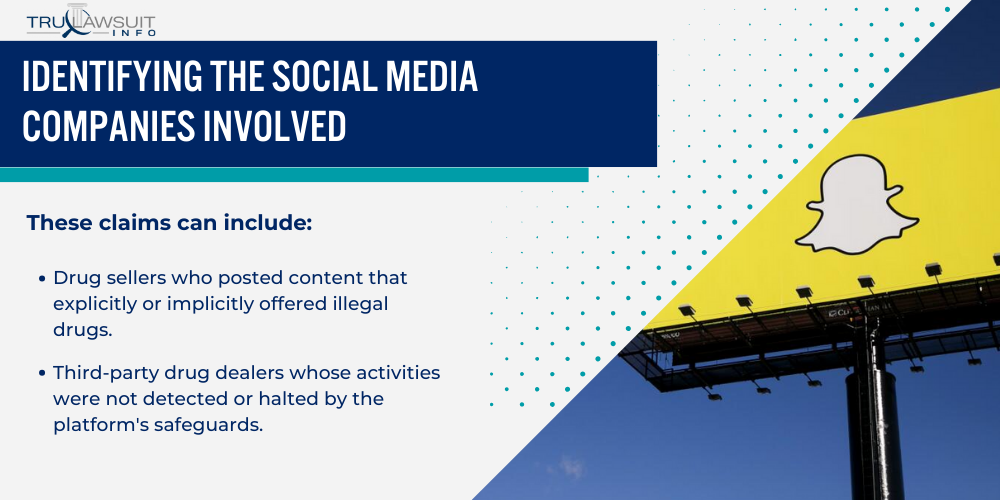
Plaintiffs and Their Claims
In cases against social media platforms like Snapchat, plaintiffs typically consist of individuals or groups who allege harm due to the platform’s practices.
For instance, Snapchat users may claim that the platform enabled third-party drug dealers to distribute content that led to dangerous exposure or harm, like fentanyl overdoses.
The Defendants: Snap Inc. and Third-Party Drug Dealers
Snap Inc., the parent company of Snapchat, often finds itself as the primary defendant in these cases.
However, responsibility may also extend to third-party drug dealers who allegedly use the platform to sell illegal substances.
These claims can include:
- Drug sellers who posted content that explicitly or implicitly offered illegal drugs
- Third-party drug dealers whose activities were not detected or halted by the platform’s safeguards
- Cases where users allegedly suffered fentanyl overdoses after interacting with dealer content on the app
- Plaintiffs who argue that Snap Inc. bears liability for the drug-related content and interactions facilitated through its service
Support for Law Enforcement Efforts in Identifying Illegal Activities
Support law enforcement efforts in combating illegal online activities, such as drug dealing on social media, is vital.
Listed below are ways in which social media companies are expected to assist:
- Providing data and analytics to track down third-party drug dealers and their content
- Implementing stringent content monitoring to prevent drug sellers from exploiting the platform
- Developing advanced algorithms to flag and remove posts promoting illegal substances
- Collaborating with agencies to educate users on the risks associated with illegal drug use and exposure
It is crucial to understand the details of the social media companies involved, the nature of the plaintiff’s claims, and how both the defendants and plaintiffs are involved in law enforcement efforts in order to navigate a Snapchat lawsuit.
Scope and Impact of Snapchat Lawsuits
Snapchat lawsuits have brought into focus the complex interplay between social media platforms and public safety.
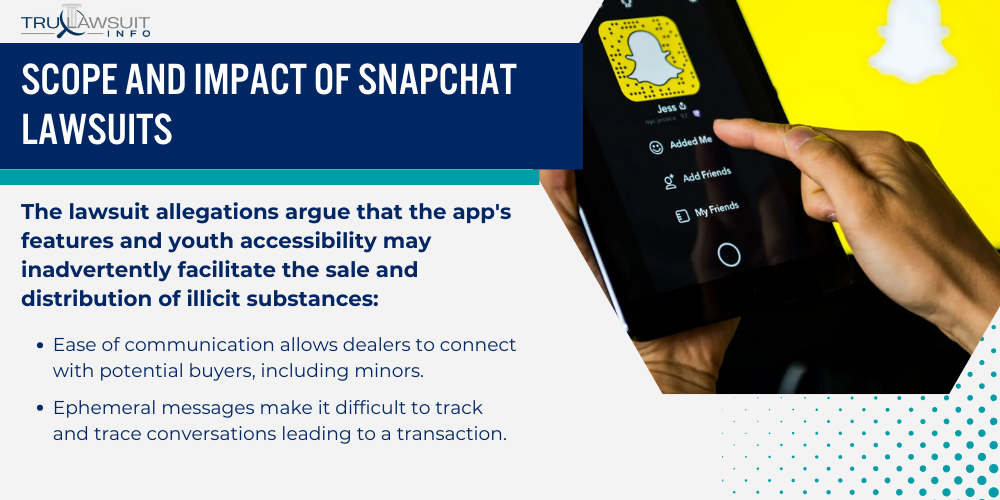
They underscore the challenging dynamics of protecting teen users while balancing the freedoms inherent in digital communication.
Alleged Connection to Fentanyl Overdoses
Snapchat has been cited in legal claims linking the platform to fentanyl overdose incidents.
The lawsuit allegations argue that the app’s features and youth accessibility may inadvertently facilitate the sale and distribution of illicit substances:
- Ease of communication allows dealers to connect with potential buyers, including minors.
- Ephemeral messages make it difficult to track and trace conversations leading to a transaction.
- Geo-location features could potentially be exploited to coordinate transactions.
- The lack of stringent verification procedures may facilitate anonymity for dealers on the platform.
Implications for Social Media Apps and Youth Safety
The mounting lawsuits signify a pressing need for social media apps to grapple with youth safety concerns.
Clarions call for tighter measures and highlight significant aspects:
- The importance of creating effective parental controls to help guardians monitor activity.
- There is a need for social media entities to invest in advanced moderation technologies.
- The critical role of user education regarding safe online behaviors and the risks of illicit drug transactions.
- Reinforcement of reporting mechanisms for users to flag suspicious activities.
Examining the Efficacy of Anti-Drug Policies and Parental Controls
As these legal proceedings surface, questions are being raised about the adequacy of existing anti-drug policies and parental controls in the digital era:
- How comprehensively anti-drug policies are being enforced on social platforms.
- The practical implications of implementing stronger verification methods to deter illicit sales.
- The extent to which current parental controls can effectively shield youth from harmful content.
- Evaluation of collaborative efforts between social media companies and law enforcement to prevent misuse.
Analyzing Legal Arguments and Counterarguments
In legal disputes involving social media giants like Snapchat, intricate legal arguments and counterarguments are presented by both plaintiffs and defense teams, often centering around content moderation, user safety, and the boundaries of platform responsibility.
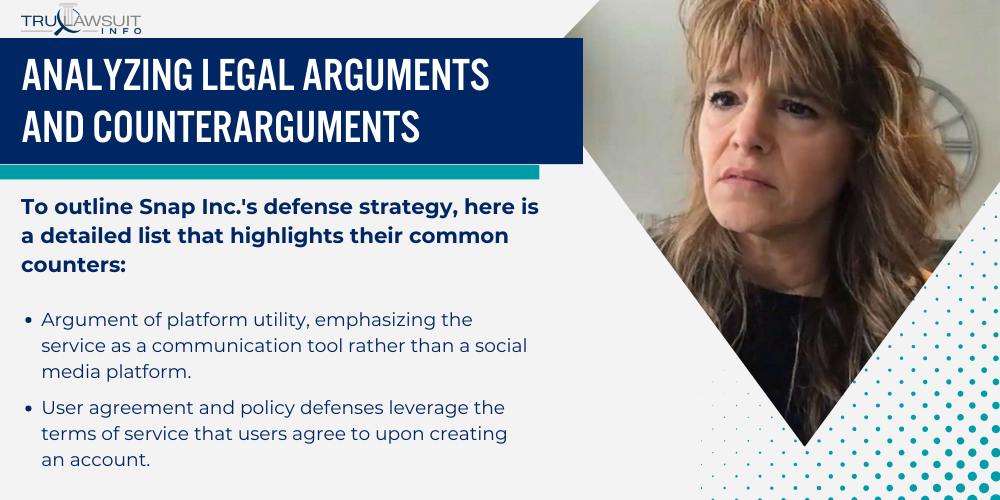
Snap Inc.’s Defense Strategy
Snap Inc. typically mounts a robust defense against allegations, focusing on a few key areas that reflect the complexities of digital communication and platform liability.
They emphasize their role as a platform rather than a publisher, which bears different legal responsibilities.
To outline Snap Inc.’s defense strategy, here is a detailed list that highlights their common counters:
- Argument of platform utility, emphasizing the service as a communication tool rather than a social media platform.
- User agreement and policy defenses leverage the terms of service that users agree to upon creating an account, which often includes disclaimers of certain liabilities.
- Content moderation efforts display the actions taken to prevent misuse and abuse on the platform.
- The assertion that claims are factually flawed, with Snap Inc. presenting evidence to refute allegations.
- Swift dismissal requests for content moderation suits that may be deemed meritless.
- Claims of snap judgments, where quick, in-the-moment decisions are necessary, are part of the service’s nature.
Plaintiff Allegations and Social Media’s Responsibility
Plaintiffs in Snapchat lawsuits typically challenge the company on various issues.
For clarity on the plaintiff’s standpoint, consider these allegations:
- Accusations that Snap Inc.’s features encourage risky behavior, potentially leading to situations that have proved fatal.
- A dozen claims related to privacy breaches, data misuse, and other consumer protection concerns.
- Lawsuits alleging that Snap Inc. failed to fight allegations regarding inappropriate content on their platform adequately.
- Content moderation concerns, where plaintiffs argue that Snap Inc. does not sufficiently protect users from harmful content.
Content Moderation and User Safety
The ongoing conversation about content moderation and user safety reflects a societal expectation for social media platforms to manage their communities responsibly.
The following points outline critical aspects of this issue:
- Industry standards and practices for content moderation acutely affect the legal arguments in these cases.
- Content moderation suits often arise when users are exposed to harmful content that the platform failed to remove.
- Plaintiffs argue for more stringent policies and system designs to ensure user safety.
- Defense teams often reference the challenges of moderating content in real time and the balance between moderation and freedom of expression.
Review of Legal Decisions and Rulings
When seeking legal representation for a lawsuit involving Snapchat or similar platforms, considering past judicial outcomes is essential to understanding the potential direction and implications of the case.
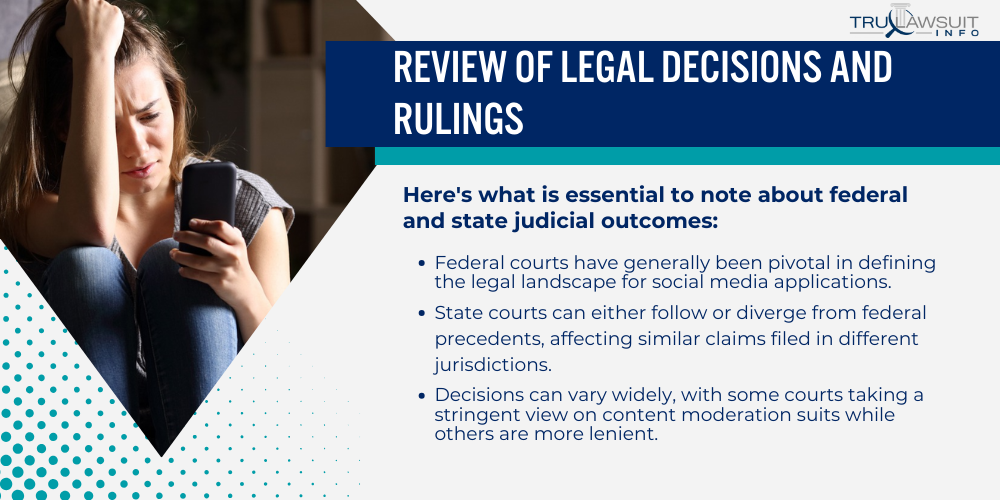
Courts have set precedents that may affect strategy and expectations.
Federal and State Judicial Outcomes
In reviewing legal decisions and rulings, a federal judge dealt with multiple cases involving social media platforms, often focusing on content moderation and user data issues.
Here’s what is essential to note about federal and state judicial outcomes:
- Federal courts have generally been pivotal in defining the legal landscape for social media applications.
- State courts can either follow or diverge from federal precedents, affecting similar claims filed in different jurisdictions.
- Decisions can vary widely, with some courts taking a stringent view on content moderation suits while others are more lenient.
- Lawsuits involving Snapchat have seen a range of outcomes influenced by the specifics of each case.
The Implications of a California Judge’s Decision
A California judge rules with potentially far-reaching consequences for technology and social media companies.
It is vital to consider the following implications of a California judge’s decision:
- The judge’s decisions might establish new standards for how social media companies handle user content and data.
- Rulings could address whether users have the right to sue companies like Snapchat over content moderation decisions.
- Outcomes may shape how other states interpret and apply laws to social media and digital platforms.
- California’s decisions are often influential, given the state’s role as a tech industry hub, potentially setting trends for other areas.
Technological and Operational Considerations
Understanding the technological nuances and operational procedures that influence legal outcomes is crucial when pursuing legal representation for a Snapchat lawsuit.
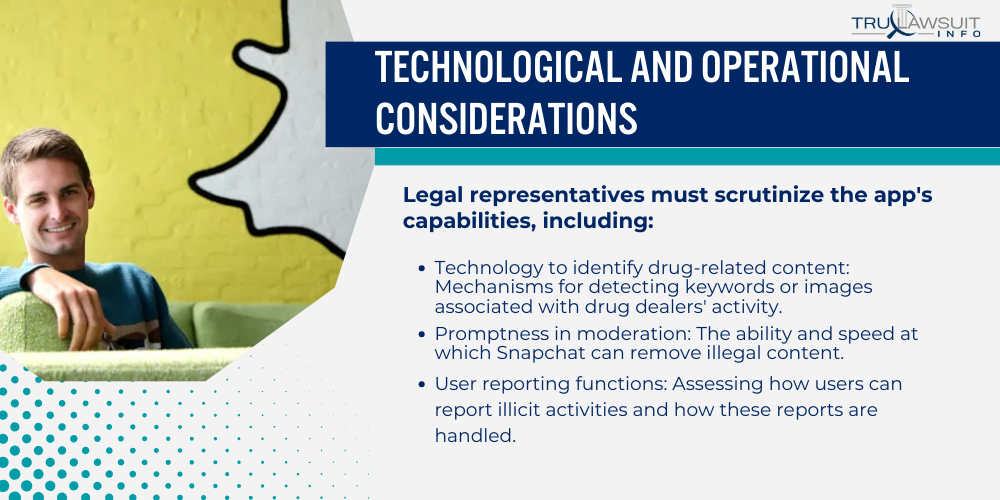
Challenges in Content Moderation
Snapchat’s ephemeral nature complicates content moderation, as unlawful content such as illicit drug sales can disappear before remedial action is taken.
Legal representatives must scrutinize the app’s capabilities, including:
- Technology to identify drug-related content: Mechanisms for detecting keywords or images associated with drug dealers’ activity.
- Promptness in moderation: The ability and speed at which Snapchat can remove illegal content.
- User reporting functions: Assessing how users can report illicit activities and how these reports are handled.
- Archival for legal proceedings: Systems exist that preserve evidence of illicit sales despite the disappearing nature of the posts.
Social media platforms like Snapchat utilize complex algorithms to personalize and distribute content to users.
These algorithms can inadvertently play a role in the promotion and dissemination of illicit drug sales.
Legal teams can leverage an understanding of these algorithms to:
- Identify Promotional Patterns: Detect algorithmic tendencies that may inadvertently promote drug-related content to users.
- Quantify Exposure: Measure the frequency and reach of drug dealers’ content on the platform, assessing how effectively they can publicize their activities.
- Evaluate Recommendation Systems: Analyze how Snapchat’s algorithm may unintentionally suggest illicit content to users, contributing to its spread.
- Ensure Policy Compliance: Verify that Snapchat’s content curation algorithms comply with the platform’s guidelines against promoting illegal activities.
By scrutinizing these aspects, legal teams can better understand the role of social media algorithms in the context of drug-related content and take steps to mitigate any negative impacts.
Anticipating Reforms and Changes in Social Media Policy
Snapchat and other social media platforms are continually updating their policies, which directly affect product and business decisions.
Legal strategies must anticipate these changes:
- Staying updated on policy revisions: Consistent monitoring of Snapchat’s evolving terms of use and community guidelines.
- Predicting legal implications: Assessing how new policies could impact current and future Snapchat lawsuits.
- Monitoring regulatory trends: Understanding possible government interventions that could alter Snapchat’s operational strategies.
- Analyzing the impact of persistent notifications: The role of Snapchat’s user engagement tactics, such as persistent mobile notifications, in promoting or curtailing illicit activities.
Conclusions and Next Steps
Determining the best course for legal representation in a Snapchat lawsuit involves understanding the litigation environment and recognizing potential outcomes.
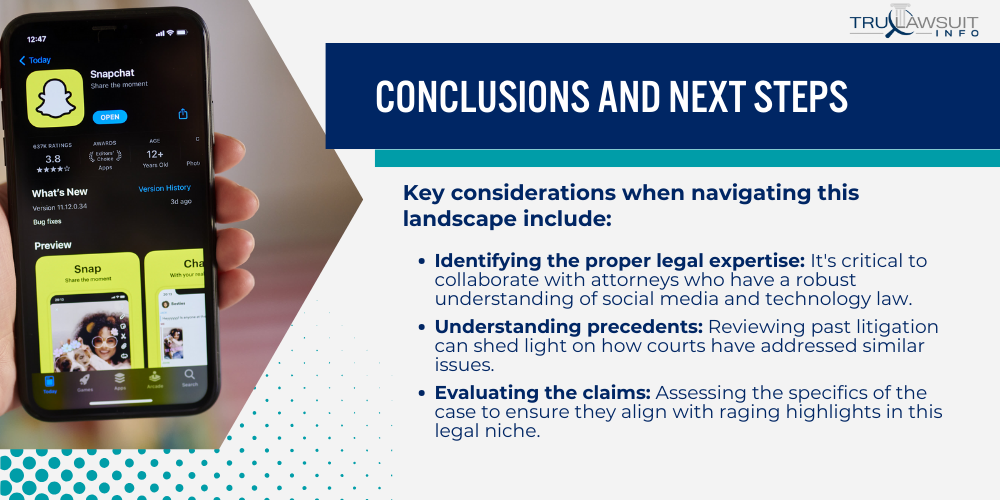
This exploration is pivotal for tech companies and individuals who aim to hold Snap accountable.
Summarizing the Litigation Landscape
In the realm of social media litigation, especially cases involving Snapchat, tech companies have seen frequent attacks on privacy and data security grounds.
Key considerations when navigating this landscape include:
- Identifying the proper legal expertise: It’s critical to collaborate with attorneys who have a robust understanding of social media and technology law.
- Understanding precedents: Reviewing past litigation can shed light on how courts have addressed similar issues.
- Evaluating the claims: Assessing the specifics of the case to ensure they align with raging highlights in this legal niche.
- Preparation for resistance: Tech companies, like Snap, have extensive legal resources and may strongly defend their position.
Potential Outcomes and Their Significance for Social Media
The implications of a Snapchat lawsuit can extend far beyond the involved parties.
They may set precedents that affect the social media industry as a whole.
Key outcomes might include:
- Changes in user policies: A ruling against Snapchat could compel a revision of user agreements and privacy policies.
- Impact on social media features: Legal action can influence the design and implementation of new social media features with privacy concerns in mind.
- Financial repercussions: Substantial damages might be awarded, influencing the way companies allocate resources for data security.
- Public perception shifts: Outcomes can alter how users perceive the safety and privacy of their interactions on social media platforms.
These steps outline a confident approach to seeking legal representation for Snapchat-related cases, highlighting the importance of a thorough understanding of the litigation landscape and its possible implications for the future of social media.
Frequently Asked Questions
-
How can I identify a qualified attorney to represent me in a Snapchat lawsuit?
Seeking a qualified attorney demands careful consideration.
One should look for lawyers with a track record in social media law and relevant case experience.
It’s advisable to verify the attorney’s credentials and ask about their previous litigation success with similar cases to gauge their expertise in the arena of social media disputes.
-
What steps should I take to claim my part of a Snapchat class action settlement?
To claim a part in a Snapchat class action settlement, a claimant must follow the specified protocol.
They should promptly complete all claim forms accurately and submit them before the deadline.
They should also ensure that they are compliant with all the settlement terms to validate their eligibility for any compensation.
-
How do I pursue a Snapchat lawsuit in the case of a wrongful death linked to the platform?
In cases of wrongful death allegedly connected to Snapchat’s platform, it is essential to consult with an attorney who specializes in such matters.
This attorney should have experience with social media-related legal issues and a strong track record in wrongful death cases.
They can help gather evidence, establish a connection between the platform’s use and the wrongful death, and navigate the complex legal challenges of holding a tech company accountable.
-
What legal actions can be taken if drug sellers post content on Snapchat that leads to harm?
When drug sellers post content on Snapchat that directly leads to harm, such as facilitating illegal drug transactions, legal action can be initiated against both the individuals posting the content and potentially Snapchat itself, depending on the circumstances.
The first step is to report the content to Snapchat and law enforcement.
Then, consult with an attorney experienced in dealing with social media and illicit content cases to explore legal options, which may include holding Snapchat accountable for failing to monitor and remove harmful content adequately.
-
How are states working to stop drug dealers from using platforms like Snapchat?
To stop drug dealers from exploiting platforms like Snapchat, states are increasingly alleging that social media companies need to be more proactive in monitoring and removing illegal content.
States argue that companies like Snapchat should deploy more advanced technology for detecting and flagging drug-related content, improve their response to user reports of illegal activities, and collaborate more closely with law enforcement.
These efforts are part of a broader push to hold social media companies accountable for the content hosted on their platforms and to protect users from harm.

Experienced Attorney & Legal SaaS CEO
With over 25 years of legal experience, Jessie is an Illinois lawyer, a CPA, and a mother of three. She spent the first decade of her career working as an international tax attorney at Deloitte.
In 2009, Jessie co-founded her own law firm with her husband – which has scaled to over 30 employees since its conception.
In 2016, Jessie founded TruLaw, which allows her to collaborate with attorneys and legal experts across the United States on a daily basis. This hypervaluable network of experts is what enables her to share reliable legal information with her readers!
Have A Case?
Here, at Tru Lawsuit Info, we’re committed to helping victims get the justice they deserve.
To do this, we actively work to connect them with attorneys who are experts in litigating cases similar to theirs.
Would you like our help?
Tru Lawsuit Info is a reliable source of information about issues that may affect your health and safety, such as faulty products, data breaches, and environmental hazards.
Our team of experienced writers collaborates with medical professionals, lawyers, and advocates to produce informative articles, guides, and other resources that raise awareness of these topics.
Our thorough research provides consumers with access to reliable information and updates on lawsuits happening around the country. We also can connect consumers with attorneys if they need assistance.
Camp Lejeune's water contamination issue spanned several decades starting in the 1950s. Exposure to these chemicals has been linked to various serious health issues, including cancer, organ diseases, and death.
Research is increasingly suggesting a link between the use of Tylenol during pregnancy and the development of neurodevelopmental disorders, such as autism and ADHD, in infants.
Legal action is being taken against manufacturers of Aqueous Film-Forming Foam (AFFF), a chemical used in fighting fires. The plaintiffs allege that exposure to the foam caused health issues such as cancer, organ damage, and birth and fertility issues.
Have A Case?
Here, at Tru Lawsuit Info, we’re committed to helping victims get the justice they deserve.
To do this, we actively work to connect them with attorneys who are experts in litigating cases similar to theirs.
Would you like our help?







